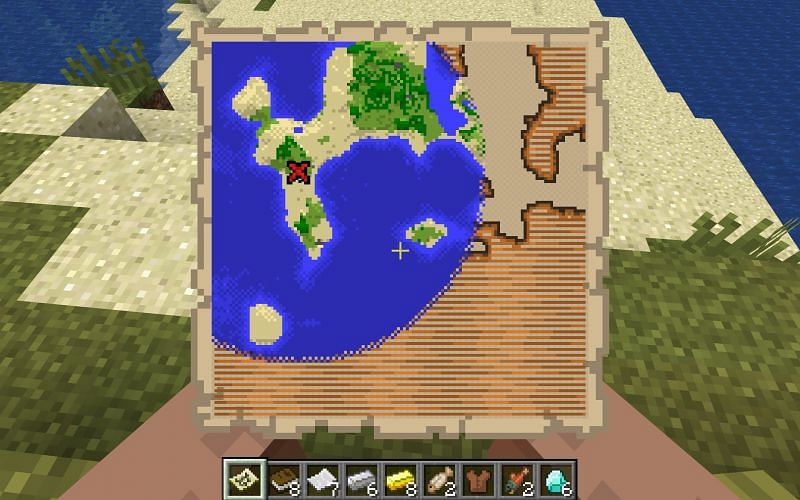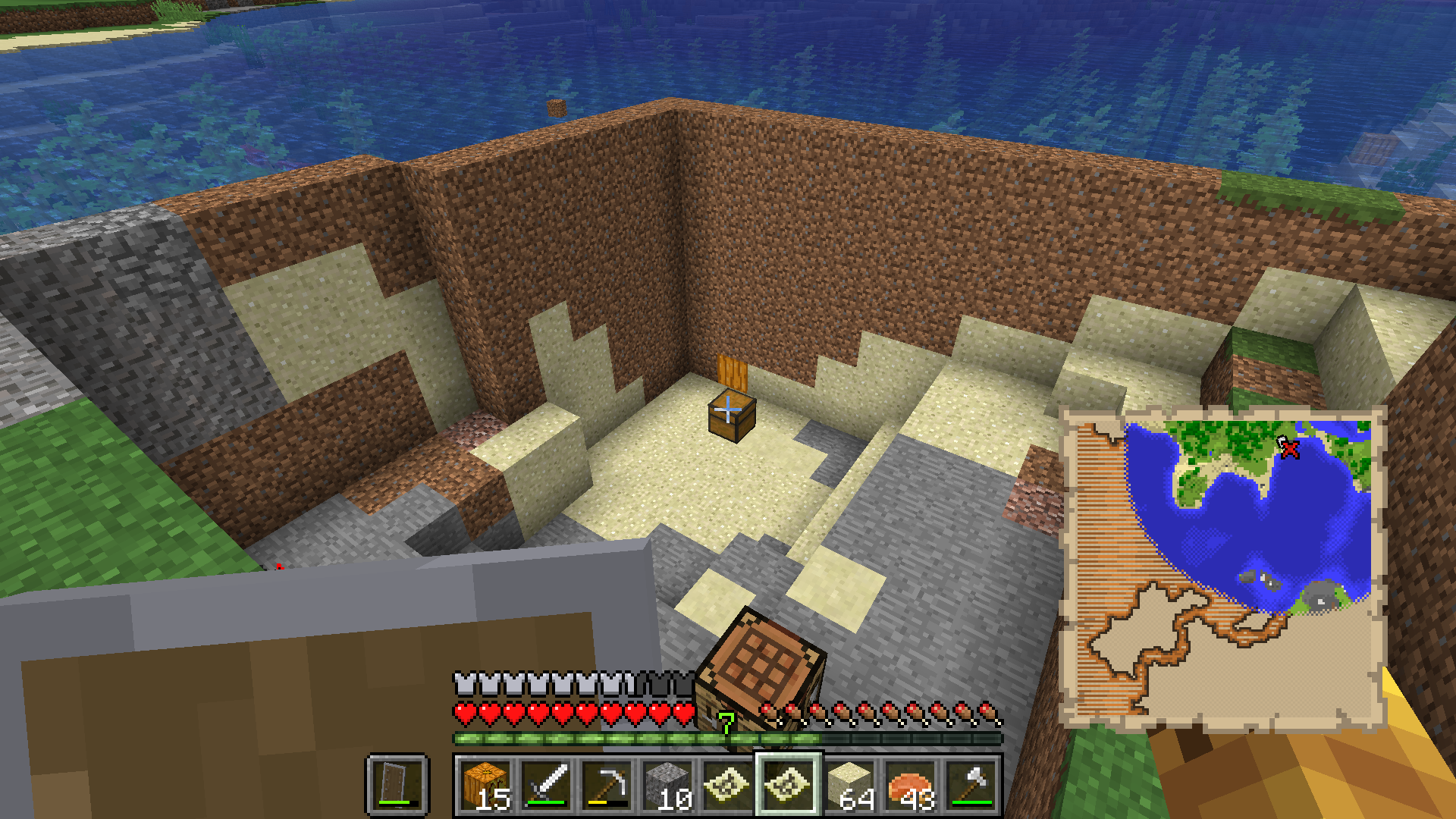Unraveling the Mystery: Treasure Maps in Minecraft Without the ‘X’
Related Articles: Unraveling the Mystery: Treasure Maps in Minecraft Without the ‘X’
Introduction
With great pleasure, we will explore the intriguing topic related to Unraveling the Mystery: Treasure Maps in Minecraft Without the ‘X’. Let’s weave interesting information and offer fresh perspectives to the readers.
Table of Content
Unraveling the Mystery: Treasure Maps in Minecraft Without the ‘X’

Minecraft, the beloved sandbox game, has captivated players for years with its endless possibilities for exploration, creativity, and adventure. Within this digital world, treasure maps hold a special allure, promising riches and secrets hidden beneath the surface. However, a unique twist exists in the game’s mechanics: treasure maps often lack the traditional "X" marking the spot, demanding players to decipher a more intricate puzzle.
This article delves into the intriguing world of treasure maps in Minecraft, focusing on those that omit the familiar "X" mark. We will explore the mechanics behind these maps, the challenges they present, and the strategies players can employ to successfully locate the hidden treasures.
Understanding the Absence of the ‘X’
The absence of the "X" on treasure maps in Minecraft introduces a layer of complexity and intrigue. Instead of a direct indication of the treasure’s location, players are presented with a more cryptic map, requiring them to interpret symbols, patterns, and landmarks to unravel the mystery. This shift from direct to indirect navigation challenges players to engage with the game’s environment in a more thoughtful and strategic manner.
The Mechanics of Treasure Maps Without the ‘X’
While the specific mechanics can vary depending on the map’s origin (e.g., generated by the game, crafted by a player, or created by a mod), the core principle remains consistent: players must use clues within the map to identify the treasure’s location. These clues can take various forms, such as:
- Landmarks: The map might depict recognizable features within the game world, like mountains, forests, or specific structures. Players must locate these landmarks in the game and use their relative positions to deduce the treasure’s location.
- Symbols: The map might contain symbols that represent specific directions, distances, or objects. Players need to decipher the meaning of these symbols and apply them to their exploration.
- Patterns: The map might contain patterns, such as lines, curves, or shapes, that represent a specific path or route to the treasure. Players need to analyze these patterns and translate them into real-world navigation.
- Hidden Messages: Some maps might contain hidden messages, encoded within the map’s design or through specific symbols. Players need to crack these codes to reveal the treasure’s location.
Decoding the Clues: Strategies for Finding the Treasure
Successfully navigating treasure maps without the "X" requires a blend of observation, deduction, and strategic exploration. Players can utilize the following strategies to increase their chances of success:
- Detailed Observation: Carefully examine the map, noting every detail, symbol, and landmark. Pay attention to the map’s scale, orientation, and any subtle variations in the terrain depicted.
- Cross-referencing with the Game World: Use the map’s clues to identify potential locations within the game. Compare the map’s landmarks with the game’s environment, searching for matching features.
- Logical Deduction: Use the map’s clues to eliminate potential locations and narrow down the search area. Consider the map’s symbols, patterns, and hidden messages to form logical deductions.
- Systematic Exploration: Explore the potential locations in a methodical and organized manner. Use the map’s clues to guide your search and avoid aimless wandering.
- Collaboration: If playing with others, collaborate on deciphering the map’s clues and strategizing the search. Combining perspectives can lead to new insights and a more efficient exploration.
The Rewards of Treasure Hunting
The rewards for successfully navigating a treasure map without the "X" are multifaceted. Beyond the tangible treasures, such as diamonds, gold, or enchanted items, players experience the following benefits:
- Enhanced Problem-Solving Skills: Deciphering treasure maps challenges players to think critically, analyze information, and solve puzzles, enhancing their problem-solving abilities.
- Improved Exploration and Navigation: The process of using clues to navigate the game world encourages players to explore their surroundings more thoroughly and develop stronger spatial reasoning skills.
- Increased Engagement and Immersion: The added layer of complexity and intrigue provided by these maps enhances player engagement and immersion within the game world.
- Sense of Accomplishment: Successfully locating the treasure after deciphering the map’s clues provides a strong sense of accomplishment and satisfaction.
FAQs about Treasure Maps Without the ‘X’
Q: How do I get a treasure map without the ‘X’ in Minecraft?
A: Treasure maps without the "X" are typically generated by the game itself, although their frequency and availability can vary depending on the game version and difficulty settings. They can also be found in specific structures, such as abandoned mineshafts or dungeons.
Q: What are some common clues found on these maps?
A: Common clues include landmarks like mountains, rivers, or specific structures. Symbols might represent directions, distances, or objects. Patterns can indicate paths or routes, and hidden messages can be encoded within the map’s design.
Q: What are the most challenging aspects of navigating these maps?
A: The most challenging aspects include deciphering cryptic symbols, identifying landmarks from a different perspective, and interpreting complex patterns. The absence of a direct "X" requires players to think more strategically and creatively.
Q: Are there any tips for decoding these maps?
A: Pay close attention to the map’s scale, orientation, and any subtle variations in the terrain depicted. Cross-reference the map’s clues with the game world, searching for matching features. Use logical deduction to eliminate potential locations and narrow down the search area.
Q: What is the best way to approach a treasure hunt with these maps?
A: Approach the hunt with a systematic and organized strategy. Explore potential locations in a methodical manner, using the map’s clues to guide your search. Collaboration with other players can be beneficial, as different perspectives can lead to new insights.
Conclusion
Treasure maps without the "X" in Minecraft offer a unique and rewarding challenge for players. By removing the direct indication of the treasure’s location, these maps force players to engage with the game’s environment in a more thoughtful and strategic manner. The process of deciphering clues, navigating the game world, and ultimately locating the hidden treasure enhances player engagement, problem-solving skills, and overall enjoyment of the game. These maps serve as a reminder that the most fulfilling adventures often require us to think outside the box and embrace the thrill of the unknown.








Closure
Thus, we hope this article has provided valuable insights into Unraveling the Mystery: Treasure Maps in Minecraft Without the ‘X’. We appreciate your attention to our article. See you in our next article!